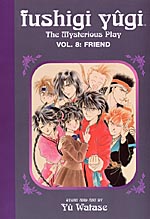 By Yû Watase
By Yû Watase
200 pages, black and white
Published by Viz
When is a book not a book? When it’s a living, breathing world in its own right. It’s rather apt that in Yû Watase’s series Fushigi Yûgi (aka The Mysterious Play) the characters have just that sort of object in the form of The Universe of the Four Gods, because one could make the case for Fushigi Yûgi itself being another such item.
Miaka was studying at the library when she first found The Universe of the Four Gods. What seemed like an ordinary book was anything but, as Miaka got sucked into ancient feudal China, where she was quickly proclaimed to be the Priestess of the god Suzaku, and was told that if she assembled all seven mystical warriors of Suzaku she could summon the god himself to grant her a wish. When Miaka’s friend Yui got pulled in as well, though, fate was anything but kind to Yui. Now Yui is using the mystical warriors of the god Seiryu to enact a misplaced vengeance on Miaka… can Miaka ever mend the rift between her and Yui, while still trying to help her friends in this new world and find true love?
Watase’s story impresses me in part simply because she’s able to juggle such a large cast of characters with the greatest of ease. We’ve got Miaka, Yui, the seven warriors of Suzaku, the handful of warriors of Seiryu that we’ve met so far… and that’s not even including the characters that Miaka and company are meeting along the way. Each character gets their own chance to shine, and even when the focus is only on a couple of characters (Miaka and her one true love Tamahome certainly get the majority of attention), Watase seems almost determined to cycle through pushing the rest into the spotlight, making sure that we neither forget about the rest of the cast nor find them under appreciated. The story itself is also pretty strong in its own right; for a basic quest motif (find these seven people, find these mystical artifacts, etc.) Watase does a great job of slipping in twists and turns where you least expect it. Watase doesn’t pull any punches, either. Yui’s rape, for instance, is a brutal event for such a sweetly-themed book early on, and hammers home that no one is safe in Watase’s story; this isn’t a sweet, fun world to be trapped in, and that every character will need to watch their step. It also shows that actions have consequences, with Yui’s trauma setting the groundwork for the feud that will fuel much of the rest of the series. Those who dismiss Fushigi Yûgi as a cute and innocent book don’t know what they’re missing.
Watase’s art has always impressed me with how she’s able to create a fully realized-character in just a few lines. There’s a definitely economy to her art, but that doesn’t mean that it isn’t expressive. The wide range of emotion that needs to be expressed in Fushigi Yûgi comes across clearly with Watase’s characters faces; it’s a pretty regular occurrence to get a quarter- or half-page zoom in on a single person’s face as they react to the sequence of events around them. Watase’s also certainly able to make her cast look good in the progress; gentle, flowing hair and soft, smooth complexions are very much the order of the day.
Fushigi Yûgi is a rich tapestry of ideas that comes together beautifully; it’s no wonder that Watase is one of Japan’s major creators, with Fushigi Yûgi spawning both a successful tv series and then direct-to-video sequels. If you haven’t picked Fushigi Yûgi up yet, you’re in luck: this June, the first two volumes are being reprinted in Viz’s new slightly-smaller and therefore less expensive new format. What perfect timing!
